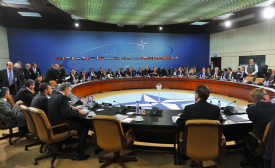nato
Halfway through an otherwise coherent conversation with a Georgian lawyer last week—the topics included judges, the court system, the police—I was startled by a comment he made about his country’s former government, led by ex-president Mikheil Saakashvili. “They were LGBT,” he said, conspiratorially.
When President Obama and European allies meet next week, they can begin forming a meaningful response to Vladimir Putin’s adventurism. This new strategy should note that Putin’s view of the world is rooted in dangerous fictions. Churchill said Russia was a riddle wrapped in a mystery inside an enigma. Under Putin, Russia’s rhetoric can be described as a fantasy inside a delusion wrapped in a tissue of lies.

NATO Secretary General Anders Fogh Rasmussen told a Washington audience on Wednesday that Russia’s absorption of Crimea is a “wake-up call” for his organization. The alarm had best ring loudly, because NATO has been sleeping deeply.
It's a good time to have friends in Eastern Europe. Leaders in the region, who have reacted to Russia's occupation of Crimea by expressing fears that they could be next, are now taking solace in their alliances. "Thanks be to God, we are NATO members," exclaimed Lithuanian President Dalia Grybauskaite last week.
Recent developments in Ukraine have been nothing less than astonishing -- and that's just as true of seasoned observers of Eastern Europe as it is of everyone else. Russia's bold and illegal military intervention issues a startling challenge not just to Ukrainian independence but also to the very foundations of the post-war liberal order.
If stepped-up US military activity with NATO partners such as Poland and Lithuania seems like a paltry response to Russia’s military occupation of Ukraine’s Crimea province, there’s a reason for that. The modest US show of force – a handful of jet fighters in Eastern European skies and a single warship to the Black Sea – is intended more to calm the nerves of former Soviet republics and satellites nervous about Moscow’s actions in Ukraine, regional experts say, than it is designed to send Russia into retreat with its tail between its legs.
The time seemed right to most observers, the place not entirely thought out. Why would the sitting, though troubled, prime minister of a country visit another sitting, but less troubled, premier of another country at a city other than the capital?
The new year will see a changing of the guard in Brussels, with top posts at NATO and the major European institutions changing hands. NATO will get a new secretary-general; new presidents will be sought for the EU Commission, the European Council, and the European Parliament; and hopefuls will jostle to succeed Catherine Ashton as the EU's foreign-policy chief.







